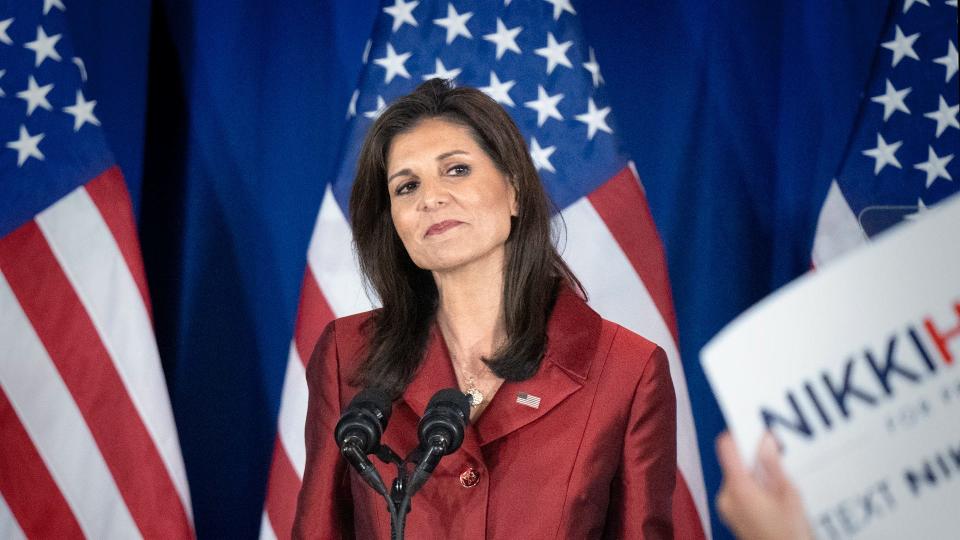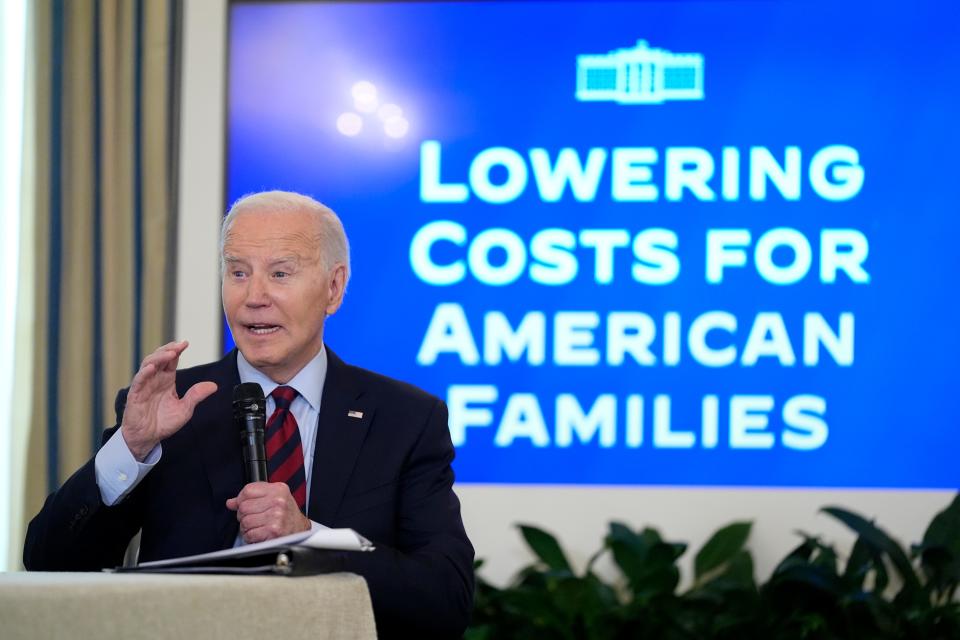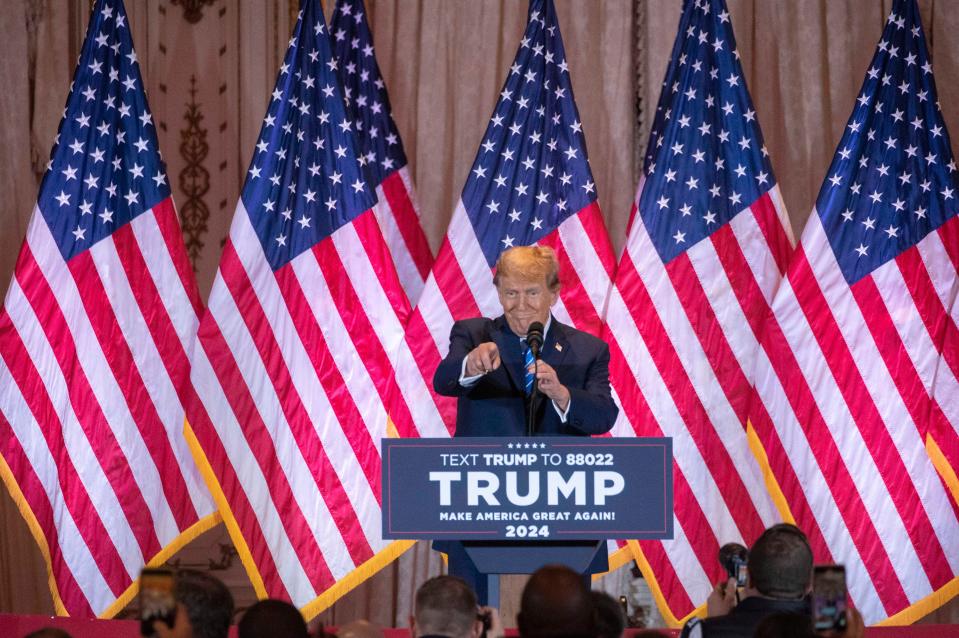Will protest votes follow the presidential candidates to Arizona? Super Tuesday takeaways
The busiest single day of the presidential primary calendar came and went quietly this year: Former President Donald Trump and President Joe Biden swept easy victories on Super Tuesday, coming steps closer to cinching nominations that for months election watchers have presumed would be theirs.
But each candidate faced defections within their parties. Trump’s leading competitor, former South Carolina Gov. Nikki Haley, continued to win sizable portions of the Republican electorate, and Biden faced backlash from progressives over his handling of Israel’s military campaign into Gaza.
Biden even lost the Democratic caucuses in American Samoa to entrepreneur Jason Palmer, a political unknown.
Those trends are expected to carry over into Arizona’s presidential preference election in two weeks. And they foreshadow the state’s general election in November, a contest that could single handedly decide the next occupant of the White House.
Here are five takeaways from Super Tuesday’s elections around the country.

The major party nominees are all but certain despite protest votes
As of Tuesday evening, most of the Super Tuesday contests had been called for Trump, where early returns show he received a majority of the vote.
Haley won an upset in Vermont, a race that the Associated Press called at 8:39 p.m. Arizona time, and polls had not yet closed in Alaska, California, and Utah.
“There’s never been anything so conclusive. This was an amazing night…," Trump said. "It’s been an incredible period of time in our country’s history. It’s been sad in so many ways, but I think it’s going to be inspiring."
Biden had an even stronger hold on his coalition. The president locked up overwhelming majorities in all 15 states, with upwards of 90% of the vote in some states, according to early returns.
“Today, millions of voters across the country made their voices heard — showing that they are ready to fight back against Donald Trump’s extreme plan to take us backwards," Biden said in a written statement.
Still, in American Samoa, the U.S. territory in the South Pacific where 91 people voted in the Democratic caucuses, Palmer defeated Biden 51 votes to 40 votes.

Biden faces protest vote over Gaza
Also on Tuesday, progressive Democrats continued an effort to voice their disapproval over Biden’s handling of the latest wave of hostilities between Israel and the Palestinian militant group Hamas.
Israel’s military campaign into Gaza, waged in response to Hamas’ Oct. 7 attacks on Israeli civilians, has drawn outcry from progressives over its steep humanitarian toll. U.N. analyses project that the Palestinian enclave will face famine in the coming months if the fighting continues.
Progressives’ campaign began in Michigan’s Democratic primary last week. In that contest, the number of protest votes on the issue, cast as “uncommitted,” appeared to exceed the margin by which Trump won the state in 2016.
Organizers continued the campaign in yesterday’s elections. In Minnesota and Massachusetts, activists asked voters to cast their ballot as “uncommitted” or “no preference.” In Virginia, people were asked to vote for Marianne Williamson, the author and activist challenging Biden who has called for a ceasefire.
Initial vote tallies on Tuesday night suggest that around one-tenth of voters did so.
Similar efforts are underway ahead of Arizona’s March 19 presidential preference election. Some Pro-Palestinian groups in the state are calling on Democrats to vote for candidates other than Biden.

Nikki Haley's vote totals could reflect Trump discontent
Tuesday’s results confirmed that Haley, who had posed the most serious challenge to Trump, has virtually no path to winning the nomination.
But they helped put a number on the Republican voters who would prefer an alternative to Trump, who is in the historic position of running for president while facing multiple criminal charges and federal indictments, some of which are related to his efforts to overturn the 2020 presidential election.
In a handful of states, including Virginia, Colorado, and Massachusetts, Haley had received roughly a third of votes cast, according to early returns Tuesday evening. In most states, her share of the vote hovered at around 25 percent or less.
Reluctance towards Trump could be a problem for Republicans in Arizona’s general election. In 2022, many registered Republicans didn’t vote for GOP candidates who echoed Trump’s denial of the 2020 election results, contributing to Democratic victories in several statewide races.
Arizona's presidential preference election won't tip the scales
Trump and Biden’s Super Tuesday winning streaks all but ensure that Arizona’s presidential preference election in two weeks will have little bearing on the party’s eventual nominee.
In past cycles, presidential hopefuls have stumped in Arizona and built campaign organizations in the state ahead of the election. With both parties’ nominations all but certain, that won't happen this time.
Instead, Arizona’s greater influence will be in the November election, when it is one of a handful of states that is seen as competitive.
Biden and Trump have pivoted to the general election
In his statement released Tuesday evening, Biden focused on the general election.
“My message to the country is this: Every generation of Americans will face a moment when it has to defend democracy. Stand up for our personal freedom. Stand up for the right to vote and our civil rights," Biden said. "To every Democrat, Republican, and independent who believes in a free and fair America: This is our moment. This is our fight. Together, we will win.”
Likewise, Trump has brushed off concerns about what's left of the GOP primary race.
“My focus is really, at this point, it’s on Biden,” he said Tuesday on Fox News.
Laura Gersony covers national politics for the Arizona Republic. Contact her at [email protected] or 480-372-0389.
This article originally appeared on Arizona Republic: Super Tuesday takeways: What do results mean for Arizona's election?
